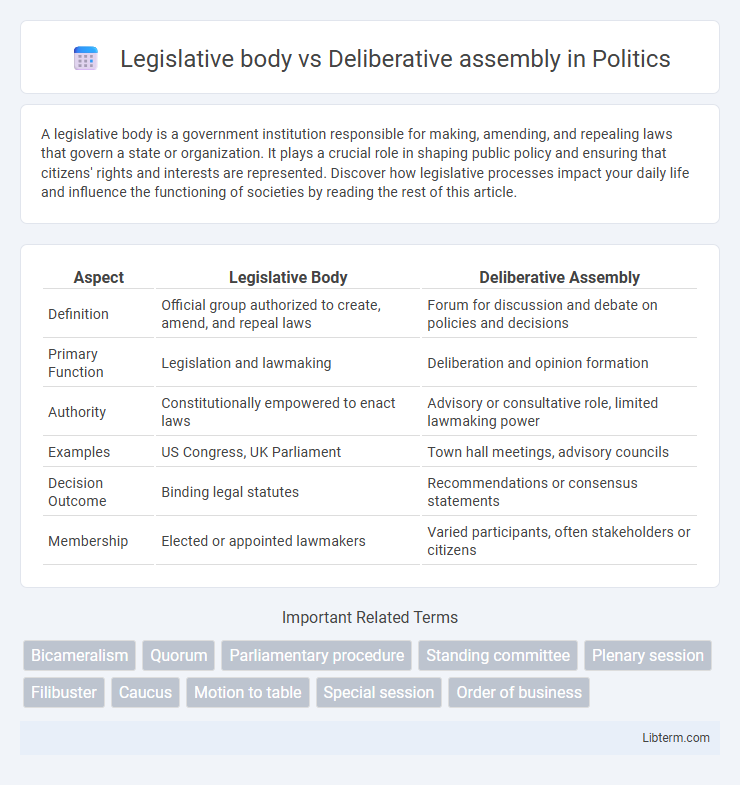A legislative body is a government institution responsible for making, amending, and repealing laws that govern a state or organization. It plays a crucial role in shaping public policy and ensuring that citizens' rights and interests are represented. Discover how legislative processes impact your daily life and influence the functioning of societies by reading the rest of this article.
Table of Comparison
| Aspect | Legislative Body | Deliberative Assembly |
|---|---|---|
| Definition | Official group authorized to create, amend, and repeal laws | Forum for discussion and debate on policies and decisions |
| Primary Function | Legislation and lawmaking | Deliberation and opinion formation |
| Authority | Constitutionally empowered to enact laws | Advisory or consultative role, limited lawmaking power |
| Examples | US Congress, UK Parliament | Town hall meetings, advisory councils |
| Decision Outcome | Binding legal statutes | Recommendations or consensus statements |
| Membership | Elected or appointed lawmakers | Varied participants, often stakeholders or citizens |
Definition of Legislative Body
A legislative body is an official governmental institution vested with the authority to create, amend, and repeal laws, typically structured as a parliament, congress, or assembly. It possesses formal legal powers granted by a constitution or legal framework to enact legislation binding on the state and its citizens. In contrast, a deliberative assembly primarily serves as a forum for discussion and debate, often without direct legislative authority.
Definition of Deliberative Assembly
A deliberative assembly is a group of individuals formally convened to discuss, debate, and make decisions on matters of common interest through a structured process of parliamentary procedure. Unlike a legislative body, which primarily enacts laws and policies, a deliberative assembly emphasizes open discussion, equal participation, and collective decision-making to reach consensus or majority agreement. Examples include local councils, boards, and committees designed to facilitate democratic dialogue and effective governance.
Historical Evolution of Legislative Bodies and Deliberative Assemblies
Legislative bodies originated as formal institutions vested with law-making authority, evolving from early assemblies in ancient Mesopotamia and Greece designed to represent citizens' interests. Deliberative assemblies, tracing back to tribal and communal councils, focused primarily on discussion and consensus-building before decision-making became formalized. Over centuries, legislative bodies institutionalized powers and procedures, while deliberative assemblies retained flexible, participatory formats reflecting local governance and civic engagement traditions.
Structural Differences Between Legislative Bodies and Deliberative Assemblies
Legislative bodies typically possess formalized structures with defined roles, such as elected representatives, committees, and codified rules governing law-making processes, whereas deliberative assemblies often emphasize open discussion and consensus-building without rigid procedural constraints. Legislative bodies operate within constitutional frameworks, enforcing specific powers related to law enactment, budget approval, and oversight, while deliberative assemblies focus on dialogue, opinion shaping, and decision-making through debate. The hierarchical organization in legislative bodies contrasts with the more egalitarian nature of deliberative assemblies, which prioritize member participation and collective deliberation over formal authority.
Roles and Functions: Legislative Body vs Deliberative Assembly
A legislative body primarily enacts, amends, and repeals laws, representing the electorate's interests through formal legislative processes and oversight of the executive branch. In contrast, a deliberative assembly focuses on discussion, debate, and decision-making among members, emphasizing consensus-building and procedural rules to guide group actions. While legislative bodies have authoritative law-making powers, deliberative assemblies often function as forums for policy advice, recommendations, or organizational governance without binding legislative authority.
Decision-Making Processes Compared
Legislative bodies typically follow formal, codified decision-making processes that involve multiple readings, committee reviews, and voting procedures to enact laws and policies. Deliberative assemblies prioritize open dialogue and consensus-building, with decision-making centered around discussion, debate, and often majority rule or consensus agreements. The structured nature of legislative bodies ensures legal validity, whereas deliberative assemblies emphasize participatory engagement and flexibility in resolving issues.
Membership and Representation
A legislative body typically consists of elected representatives who hold official authority to create, amend, and repeal laws within a government framework, ensuring formal legislative representation across constituencies or districts. A deliberative assembly, while also involving members who discuss and debate issues, may include a broader range of participants such as appointed members or stakeholders and prioritizes collective decision-making through discussion rather than formal legislative power. Membership in legislative bodies is strictly defined by legal mandates, whereas deliberative assemblies emphasize inclusivity and representation of diverse viewpoints to inform policy or organizational decisions.
Legal Authority and Jurisdiction
A legislative body holds formal legal authority granted by a constitution or statute to enact, amend, and repeal laws within a specific jurisdiction, exercising sovereign legislative power. A deliberative assembly functions primarily as a decision-making forum where members discuss policies, proposals, and organizational issues but may lack independent legislative authority or statutory lawmaking power. Jurisdiction of a legislative body typically encompasses national, state, or regional governance, while a deliberative assembly's scope is usually confined to organizational, advisory, or procedural matters without binding legislative enforcement.
Examples of Legislative Bodies and Deliberative Assemblies Worldwide
Legislative bodies such as the United States Congress, the UK Parliament, and the German Bundestag are formal institutions responsible for creating, amending, and repealing laws within their respective countries. Deliberative assemblies, including the United Nations General Assembly, the European Parliament, and India's Gram Sabhas, focus primarily on discussion, debate, and decision-making to guide policies or local governance. These examples highlight how legislative bodies hold statutory lawmaking power, whereas deliberative assemblies often emphasize consensus-building and represent diverse stakeholder interests.
Key Similarities and Distinctions
Legislative bodies and deliberative assemblies both serve as platforms for discussion, decision-making, and policy development, sharing functions like debating issues and voting on proposals. Legislative bodies specifically possess the authority to create, amend, and repeal laws within governmental frameworks, while deliberative assemblies may include various groups, such as corporate boards or committees, with broader decision-making purposes that do not necessarily involve lawmaking. The key distinction lies in the legislative body's formal statutory powers versus the deliberative assembly's focus on collective opinion formation and governance in diverse organizational contexts.
Legislative body Infographic

 libterm.com
libterm.com